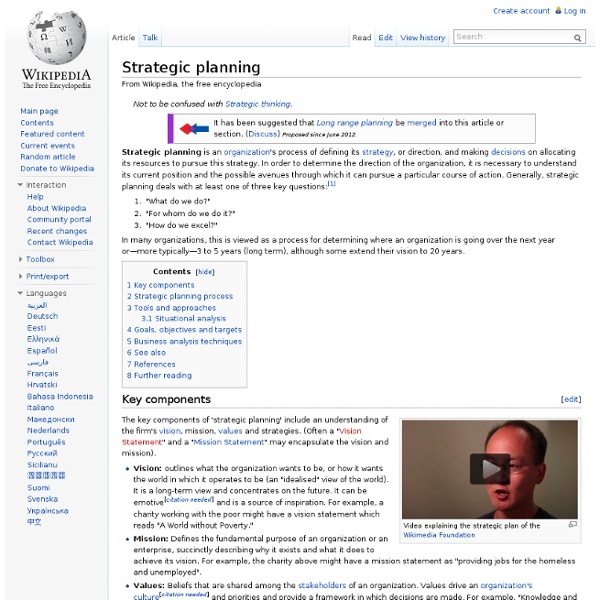Strategic planning

SMART criteria
Mnemonic, giving criteria to guide in the setting of objectives SMART is a mnemonic acronym, giving criteria to guide in the setting of objectives, for example in project management, employee-performance management and personal development. The letters S and M generally mean specific and measurable. Possibly the most common version has the remaining letters referring to achievable (or attainable), relevant, and time-bound. The first-known use of the term occurs in the November 1981 issue of Management Review by George T. Often the term S.M.A.R.T. History[edit] The November 1981 issue of Management Review contained a paper by George T. Ideally speaking, each corporate, department, and section objective should be: Specific – target a specific area for improvement. Current definitions[edit] Each letter in SMART refers to a different criterion for judging objectives. Choosing certain combinations of these labels can cause duplication, such as selecting 'attainable' and 'realistic'.
Related:
Related:




-------------------------------------------------------------------------------------------------------------------------------------------------------------------
2025-08-03 20:29
by raviii Aug 5
Strategic Approach - The use of a strategic approach means that the researcher, having settled upon the research question, will gather whatever samples are necessary to throw light on the question. Creative flexibility will be employed, and the precise direction of the data collection process will emerge only as the project develops. Tactical initiatives (q.v.) may lead the researcher in unanticipated directions.
Found in: Davies, M. (2007) Doing a Successful Research Project: Using Qualitative or Quantitative Methods. Basingstoke, Hampshire, England, United Kingdom: Palgrave Macmillan. ISBN: 9781403993793. by raviii Jul 31